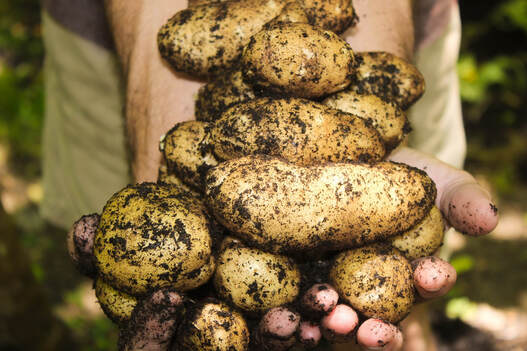 Potatoes are a garden gem that too many gardeners avoid. They are simple to grow and so delicious right from the garden. But if you decide to do it, don’t believe the internet type about growing potatoes in towers as this method is more work and does not yield you more potatoes. You can grow them in straw or you can plant and forget them. Potatoes will even grow in 5 gallon buckets! If this garden gem isn’t on your must grow list add it to your list for next year. When to plant? Keep in mind that potatoes are cool weather growers. It's best to plant in early spring. In fact, planting potatoes two to three weeks before your last frost date will produce the most satisfactory results. For Michiganders, that means the last week of April through the first week of May. If you live in West Michigan, and are looking for help growing things like potatoes in your garden, we'd love to work with you. Click to learn more about our Garden Pro service.
0 Comments
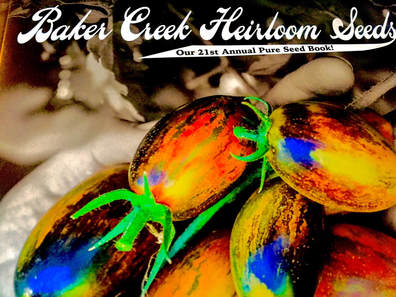 Michigan is 2 weeks into winter and all this snow has me daydreaming of Spring. The beautiful seed catalogs that are steadily landing in my mailbox definitely help me think warm thoughts, as well as plan my upcoming garden.I am often asked where I purchase seeds and transplants, so I thought I’d share a few of my favorites. I order from a variety of places for a variety of reasons, and all seeds I order are non-GMO and preferably organic. Baker Creek Heirloom Seeds-I love, love, love their catalog! If you haven’t received their free catalog you are missing out on a work of art! Seriously order the catalog now! I have ordered seeds from Baker Creek most year and will do so again. They offer unique seeds and have great germination rates. Johnny’s Selected Seeds-An old stand by for me at seed ordering time. Selection and variety are similar to Baker Creek Heirloom Seeds. Customer service is excellent and their growers library is very useful. Seeds Now-This is a new find for me this year, but I have to say I am impressed with the selection. My favorite part of ordering from them is the sampler packs. For 99 cents to $1.99 you can purchase a smaller number of seeds. For example, Brandywine Tomato seed sampler pack gives you 15 seeds for 99 cents! This is perfect for a backyard gardener who wants to start a variety of tomatoes instead of a dozen of the same type of tomato. Once we actually get close to planting, you can find quality transplants readily available locally. Here are three local sources we love: Grand Shire Farm-Available at the Fulton Street Market in Spring. I have purchased herbs, lavender, and chamomile from them with great garden success. They have a variety of each and are knowledgeable about which variety will suit your needs. Well House-We love the mission of Well House and started attending their yearly plant sale last year as a vendor. The farmer, Alec, grows thousands of transplants to sell at the sale and proceeds benefit the gardens for the Well House residents. This is more than a ho hum plant sale! There is food, music, and great vibe as well as a nice variety of plants. Three Acre Farm-Lori from Three Acre Farm started her flower from in 2017. If you haven’t made it out to cut your own bouquet you are missing out on pure beauty! In the Spring she also offers tomato, pepper, and herb transplants. I didn’t make it out to Three Acre Farm last year, but some friends did and boy did they rave about their tomatoes! This is by no means an exhaustive list of the only places to purchase quality seeds and transplants, but they are my favorites. Do you have a favorite that didn’t make the list? Share in the comments section below. Happy gardening! 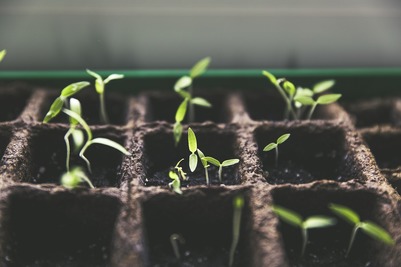 Good Sweet Earth is offering a new service for West Michigan gardeners looking to take their garden to the next level this year: Your own personal gardening consultant to work with you, from the planning of your crops through the harvest. You'll have your very own Master Gardener to walk you through the entire growing season! Need help with your garden? Want to maximize your harvest? Looking for someone to answer tough questions as they pop up during the growing season? We got your back! Whether you do container gardening, raised beds or have a quarter-acre of yard space ready for planting, we can help! Here's what's included in your season-long Gardening Consultant Service: 1. An on-site assessment of your garden space-- we'll check your soil, sunlight, irrigation, space, etc. 2. A personalized plan for when and where to plant your seeds and seedlings. We'll sit down with you to go over the fruits, veggies and herbs you and your family most enjoy, and we'll map out your garden to maximize your harvest. We'll also make recommendations on different plant varieties based on your level of gardening experience, West Michigan climate and your personal tastes. 3. Season-long guidance. Questions always come up, but with Good Sweet Earth, you'll have an expert at your beck and call as you encounter pests, unproductive plants, fertilization questions, and any other curves nature can throw at you. We'll walk you through it all season long, from planting in the spring to wrapping things up in the fall! 4. Discounted soil test and analysis. We'll knock $10 off of our soil test and analysis. Testing is done at a Michigan State University lab, and analysis will give you guidance on how to effectively amend your soil for maximum results! Regular price is $50; discounted price is $40. This package is only available to West Michigan residents (Kent, Ottawa and Allegan Counties), and is only available for purchase during the months of September-April, so that we can have adequate time to come out and assess your garden space and prepare your customized garden plan for spring. Best part? It only costs $100, but the food you'll harvest will be worth it! Questions? Email Corey at Corey@GoodSweetEarth.com. Ready to purchase? Sign up here and we'll be in touch to schedule an on-site assessment of your garden space! 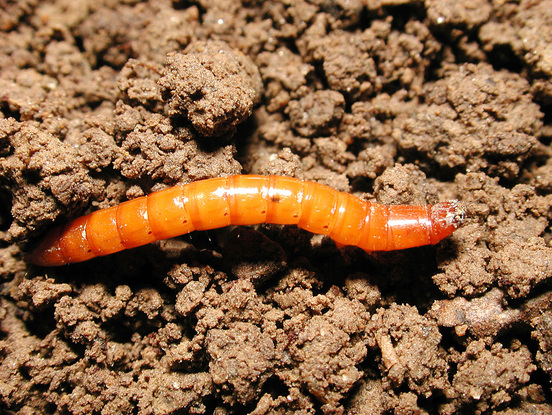 This spring we put two new raised beds in our garden and filled the beds with a mixture of our own Living Worm Compost and a topsoil blend that we purchased from our favorite local supplier. I planted my early crops, weeded and waited. About a week before my pak choi cabbages were ready to harvest I noticed they were not growing as well as they should have been. So being a curious gardener, I investigated, both above and below the ground! In the soil I noticed a small reddish-brown worm-like creature that I had never encountered before. Folks, my lovely topsoil blend that I bought from our favorite local supplier came with its own batch of wireworms! And wireworms, it turns out, are bad news. They eat the roots of plants, attack seedlings, and bore holes into potatoes, radishes, and carrots. I promptly called the local supplier to let them know they sold me tainted soil and asked them for suggestions on ridding my garden of these nasty critters. Unfortunately their only solutions involved chemicals, and lots of them! No thank you! So like any good Master Gardener worth her weight in compost, I did a bit of my own research. I soon discovered that beneficial nematodes would do the trick and clear these things right up. Now, what in the world is a beneficial nematode you ask? Let me explain. Beneficial Nematodes (Steinernema feltiae) are effective killers of any pest that lives in or on the soil, but they’re safe for humans, pets, plants, and earthworms. These amazing microscopic parasites continue working in your soil for 18 months after application. Some of the 230 pests that beneficial nematodes can destroy include wireworms, white grubs, fungus gnats, and black vine weevils…just to name a few. I ended up ordering my nematodes online since the discovery was made on a holiday weekend and I was unable to find them locally. While I waited for my order to arrive I did try an old-time remedy I found online: I cut a potato in half and stuck a stake in it then buried it in the soil. The wireworms were attracted to the potato and ultimately left my plants alone while I waited for my beneficial nematodes to arrive. (In my opinion, the potato trick was a nice temporary fix, but would not have saved my garden; the beneficial nematodes were absolutely necessary to fix the problem. However, seeing that potato draw in the wireworms did help me feel like I was being proactive while I waited for my nematode delivery.) Like all organic remedies the beneficial nematodes took a few days to work, and I will have to apply them again next season just to be sure I don’t see wireworms again. But that’s a small price to pay for a pest-free, and chemical-free, garden. -Corey Veldheer, Certified Master Gardener and owner of Good Sweet Earth 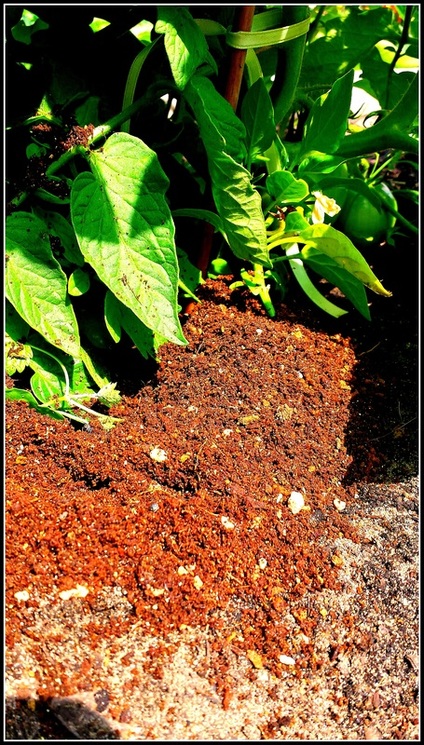 A tomato plant top-dressed with Good Sweet Earth's Bold Tomato-- July 7, 2016 A tomato plant top-dressed with Good Sweet Earth's Bold Tomato-- July 7, 2016 Back in the spring, as you were getting your garden ready for the year, you most likely worked some compost into your soil (hopefully Good Sweet Earth's Living Worm Compost!), you planted your garden and now you are waiting for those first red tomatoes of the year… or maybe you’re already enjoying some fruits of your labor. So there’s nothing left to be done, but pick cucumbers and make pickles, right? Unfortunately, no. Your plants continue to need nutrients throughout the season! Now if you’re growing your garden the right way—organically, with no chemicals-- that means Miracle Gro isn’t an option at this point. But the plants still need some food—so what do you do? Six words: Top dress, top dress, top dress. If you want to maintain your chemical-free organic garden, and see amazing results, you need to top dress your plants at least once during the growing season. This tried and true organic garden practice is easy and your plants will flourish. I’m serious, they’ll absolutely explode. In fact, I’ve seen a tomato plant more than double its production from year to year when top dressed with Worm Compost. Here’s what you do: take some Living Worm Compost and place a layer around the base of your plant approximately ½ inch think and 3 inches wide. After spreading it around your plants water deeply to let the nutrients go down into the soil. Take care not to spread compost in the bare spots in the garden as you don’t want to feed the weeds! Here’s the best part: Living Worm Compost can be applied as often as you like—you’re never gonna overdo it or burn the plants. But at a minimum, you need to do it at the beginning of the season and again when your plants start fruiting. Pair Living Worm Compost with our Worm Tea and you’ll see some amazing results! Did you know that Living Worm Compost can also be used on potted plants as well as your lawn? If it grows in soil, Living Worm Compost will feed it! Try a bag, and see how much of a difference top dressing can make. If you've got tomatoes, try top dressing with Bold Tomoto. Got roses? Try Dulce Rosa. You'll be amazed by the results! -Corey Veldheer, Certified Master Gardner, Michigan State University Extension & owner of Good Sweet Earth |
